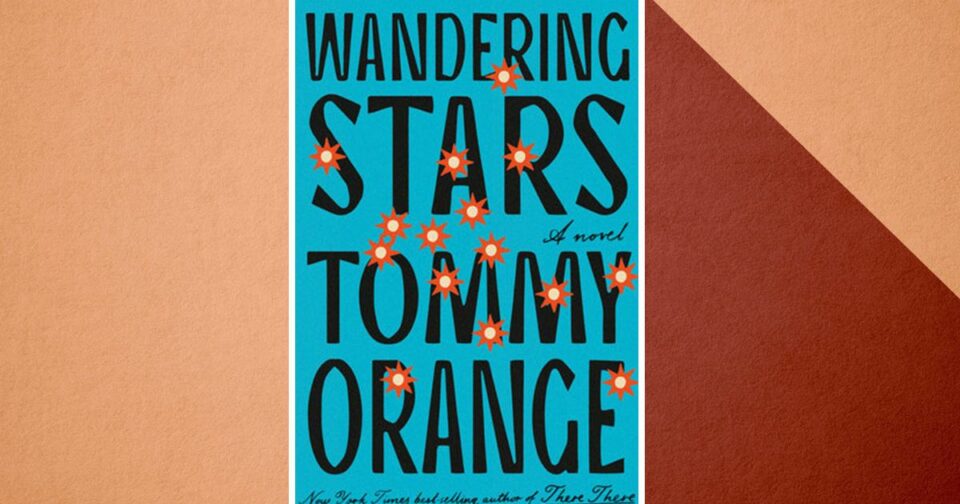Orvil Red Feather, the teenage protagonist of Tommy Orange’s novel Wandering Stars, was just beginning high school when he was shot at a powwow in Oakland, California. The stray bullet that hit him made its way into his stomach and stayed there. Although he survived, his family — his two younger brothers; their great-aunt Opal Bear Shield, who raised them; and their recently resurfaced grandmother Jacquie Red Feather — is utterly changed by that moment of violence. To them, “it was as if the hole made in him that day brought a new world out from inside him,” one that all five family members must now live in. It’s around this time that Orvil is prescribed an opioid, hydromorphone, for his pain. The hole left by the bullet, he thinks, “felt open, and like something was coming through, out of it, asking something of me in return, like it needed to be filled, and here were these pills.”
In Wandering Stars, a centuries-spanning epic of a Native family that manages to feel profoundly intimate, Orange writes about liquor, drugs, and even the ominously unlabeled pills that Orvil ends up taking (which he calls “Blanx”) as an ambivalent force and goes to lengths to show why his characters intoxicate themselves and how right it can feel to them. Even when these substances cause harm, the path to addiction has a logic to it that’s presented without judgment. With a narrative that begins in the 1800s, the book shows us that addiction recurs through generations of Orvil’s family — along with many other things: freckles, musical ability, bullets, a habit of making rubber-band balls, and the parts of Cheyenne belief and history that outlast the U.S. government’s brutal efforts to assimilate Native Americans. The details of that national project of cultural genocide are something Orvil and his brothers are only vaguely aware of.
Orange, who is an enrolled member of the Cheyenne and Arapaho tribes, introduced Orvil’s family in his remarkable 2018 debut, There There. Dazzling and tightly wound, polyphonic and opinionated, the novel was a finalist for the Pulitzer Prize. It sometimes creaks under the weight of the many perspectives it contains; set in Oakland, where Orange lives, it inhabits a massive cast of Indigenous characters related mainly by coincidence. It starts the buildup quickly — right away, we know there will be a gun. The writer has said that Wandering Stars is both a prequel and a sequel to his first book, which ends with Orvil’s shooting. To me, though, the new book stands on its own; reading it feels like focusing your eyes on one eventful corner of a massive tableau.
The novel begins in 1864 with a young man named Bird waking up from a bad dream to the sound of cannon fire and gunshots: Hundreds of U.S. Army cavalrymen are descending on his Cheyenne and Arapaho camp in what will eventually be known as the Sand Creek Massacre. Bird escapes with barely a memory of his life before, stops talking, and, after 11 years of transience, is arrested and taken to a star-shaped prison in Florida called Fort Marion. There, a jailer named Richard Henry Pratt — based on a real historical figure — is experimenting with a way to take away Indianness in order to produce American citizens. “He believed wholeheartedly that all Indians were men,” writes Orange, or that they can become men if they “cross the waters of discipline and manners.”
The scenes at the prison are a brief part of the novel but dreamlike and significant. Pratt takes away the prisoners’ blankets and clothes, replacing them with military uniforms so they can become “wolves of the U.S. Army.” Bird, who soon adopts the name Jude Star, learns to read and write by studying the Bible, which he finds strange and important. But he doesn’t begin speaking again until he finally leaves the prison and takes his first sip of alcohol. After that, whenever Jude drinks, he feels loose and light the next morning, something “more than drunk”; he won’t be able to let go of that feeling, or of alcohol, until he goes to peyote church, participating in a ceremony that has been outlawed by the U.S. government. While drinking restores his speech, peyote shows him a “core being and beating heart” he thought he had lost.
From there, time spins forward. Charles, Jude’s son, turns to laudanum to snuff out his memories of the government-run boarding school he was made to attend. After a forced adoption in the following generation, the family line is nearly broken, and the fact that it survives that rift is almost miraculous. Orange is sly and flexible with his narrative approach in these early sections. There’s a brief nonfiction prologue. He writes one part in the second-person imperative, like a parent gently nudging their child through the plot of her life, guiding her away from danger: “Walk away. Ignore him yelling after you. He is lying.” The author has said he’s not that interested in writing scenes or dialogue — he’s more focused on voice. When he started reading seriously, he told one interviewer, “I preferred José Saramago going on for 15 pages without a single paragraph break or even a period.” The first part of Wandering Stars especially has something in common with work by the Portuguese writer, humming through lifetimes on the level of thought. But the last two-thirds of the novel, which settle in with the Red Feather–Bear Shield family in 2018 Fruitvale, Oakland, don’t sidestep dialogue at all.
This is a book where people talk when they have something to say and when they don’t. Their conversations are full of boredom, irritation, and affection. “Why’s it gotta be so hard for people in this family to just be normal. Not fuck with shit,” says Orvil’s brother Loother. “Fuck with shit? Is that Shakespeare?” Jacquie asks him with a laugh that he doesn’t return. Adults, in a sidelong way, try to find out what the kids are up to. We listen in on children stuck in a car together. Jacquie is an alcoholic, and as Loother and their youngest brother, Lony, wait for her outside an AA meeting, they play a rhyme game. Palace rhymes with chalice. But what rhymes with relapse? That’s as close as the boys get to talking about their grandmother’s precarious sobriety; their worry crops up quietly, shamefully, between school days and games of dominoes.
There are points when these characters seem to be hitting all their cues too neatly, in ways that seem awkwardly designed to surface some historical detail. In one scene, Pratt spends a few pages thinking about Theodore Roosevelt’s bird-conservation campaign. There’s a distracting subplot about Orvil’s new friend Sean, who supplies him with pills and who has just found out he himself is part Native. He’s a complex character in his own right, but the novel is at its best when it lets us while away time with the Red Feather–Bear Shield family. Some scenes feel lifelike in their miscellaneousness. Phrases and images repeat without explanation, seemingly crucial but absent assigned meaning. When a scrawny dog shows up multiple times, generations apart, we’re allowed to assess it as we’d like, and so are the family members. Some of them are afraid of it. Others let it sleep in their bed.
The characters aren’t always interested in engaging with the heaviness of their situation. They squirm under the obligations of their identities and dream of detaching themselves from all the trouble and suffering associated with them. Native things, Orvil says, “can feel corny, and fake, or like trying too hard for something that wasn’t really there.” As his Arapaho therapist launches into an explanation of “trauma response,” Orvil tunes out, turning his attention to a bird outside the window. It’s hard to blame him for his teenage skepticism, or to discount his belief that pills are the thing that will bring him closer to some long-buried sense of significance. If There There moved toward its violent conclusion on a fixed forward track, Wandering Stars is about what comes after the worst has happened. Like the parts of the Red Feathers’ history that are worth saving but almost out of reach — a misplaced sheaf of letters, a half-remembered Cheyenne rule against stepping over somebody’s body — the origins of the family’s pain can seem just outside their field of vision.
Wandering Stars by Tommy Orange is available today from Knopf.
Related
- 23 Books We Can’t Wait to Read in 2024
- Teju Cole, Reluctant Cosmopolitan
- How Zadie Smith Lost Her Teeth
Emma Alpern , 2024-02-27 13:00:24
Source link


